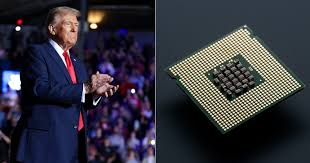
Trump Imposes 100% Tariff on All Semiconductor Imports

 :
| Updated On: 07-Aug-2025 @ 5:07 pm
:
| Updated On: 07-Aug-2025 @ 5:07 pmSHARE
Trump Announces 100% Tariff on Foreign Semiconductors, Sparking Global Reactions
Former U.S. President Donald Trump has declared that a 100 percent tariff will be imposed on all foreign-made semiconductors, with exceptions for companies that have invested in manufacturing within the United States. The announcement, made from the Oval Office on a Wednesday evening, reflects Trump’s aggressive protectionist economic stance and is designed to boost domestic chip production.
Trump clarified that the tariff will apply broadly to all chips and semiconductors, but companies building facilities in the U.S. will be exempt—even if those facilities are not yet operational. This statement came shortly after Apple revealed its massive $600 billion investment in the U.S., although the tariff announcement was not entirely unexpected by policy watchers.
On Tuesday, Trump had told CNBC that a new semiconductor tariff would be introduced “within the next week or so,” though he offered no detailed plan. Consistent with that, Wednesday's announcement also lacked clarity regarding how and when the tariffs would be enforced. Nonetheless, the global semiconductor industry—especially major producers in Asia—quickly responded to the potential consequences.
Exemptions and International Reactions
Taiwan, home to TSMC (the world’s largest chipmaker), announced that TSMC would be exempt due to its existing investment in U.S. facilities. Liu Chin-ching, head of Taiwan’s National Development Council, informed the legislature that since TSMC operates manufacturing plants in the U.S., it qualifies for exemption.
Earlier in March, TSMC had pledged to increase its investment in the U.S. to $165 billion, expanding chip production and R&D facilities in Arizona. TSMC counts major global tech firms like Apple and Nvidia among its clients, making its exemption critical for maintaining supply chains.
South Korea also responded swiftly. The country’s major semiconductor firms, Samsung and SK Hynix, have invested in U.S. facilities in Texas and Indiana. Trade envoy Yeo Han-koo confirmed that South Korean chipmakers would also be exempt. He noted that South Korea enjoys favorable tariff conditions under a recent trade deal with the United States.
These developments are part of a broader trend initiated under President Joe Biden’s administration with the CHIPS Act, a bipartisan measure introduced in 2022. The Act provided billions in subsidies and tax incentives to re-shore semiconductor production and reduce dependency on foreign supply chains, especially in light of rising geopolitical tensions.
Negative Impact on the Philippines
Not all countries are benefiting from exemptions. The Philippines is among the most vulnerable, with Dan Lachica, president of the Semiconductor and Electronics Industries in the Philippines Foundation, warning that the 100% tariff could be “devastating.” He pointed out that semiconductors account for 70% of the Philippines’ total exports, making the economy highly sensitive to changes in U.S. trade policy.
Broader Trade Policy Context
Trump’s semiconductor tariffs are part of a wider protectionist agenda targeting various industries. Alongside chips, the White House has announced or implemented separate tariffs on steel, aluminum, automobiles, and pharmaceuticals. These blanket tariffs are set to take effect Thursday and mark a significant escalation in U.S. trade policy, potentially triggering global economic ripples.
In summary, while the tariff aims to revitalize U.S. semiconductor production, it introduces new uncertainty and strain on international trade relations, affecting both allies and developing economies.